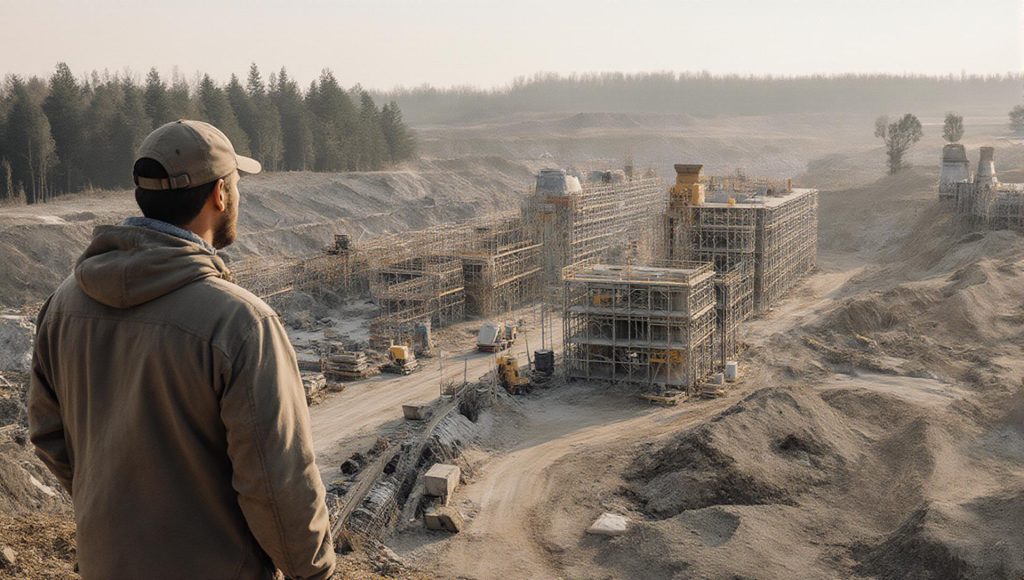
In a recent episode of the Site Visit Podcast, James Faulkner, Founder & CEO of SiteMax, sat down with Paul Atherton, founder of High Spire, to discuss how construction companies can build substantial wealth by combining operational excellence with strategic real estate investment. The conversation revealed a compelling approach that goes beyond traditional business growth models.
High Spire’s core mission centers on helping construction companies build wealth through two primary channels: creating self-managed companies and leveraging retained earnings into real estate development. According to Atherton, construction companies are uniquely positioned to excel at three wealth-building activities simultaneously: operating a business efficiently, buying and selling assets more effectively than the broader marketplace, and adding value to those assets while owned.
“Construction companies are uniquely positioned to do all three of those activities at the same time, which makes owning a construction company very, very compelling for anybody who has a desire to build wealth,” Atherton explained.
The discussion highlighted why construction companies have distinct advantages in real estate development compared to traditional real estate developers. Construction business owners possess deep knowledge of building science, maintain realistic perspectives on cost estimates, can move faster on deals, and have extensive networks of potential investors and partners.
Three critical factors determine real estate project success: purchase price, development cost basis, and market timing. Construction companies excel at controlling costs and accurately predicting development expenses, giving them a significant edge over developers who lack hands-on construction experience.
High Spire works primarily with general contractors and larger sub-trades, typically those with substantial cash flow and established leadership teams. The company has grown to serve approximately 115 clients across North America, with about 75% in the United States and 25% in Canada.
High Spire’s approach revolves around what Atherton calls the “Four Cs”:
Community: Clients gain access to business operators who have already achieved their goals. Events consistently feature successful entrepreneurs running larger companies, creating valuable networking and mentorship opportunities.
Content: The company provides simplified, benchmarked systems based on high-performing construction companies. Rather than overwhelming clients with dozens of standard operating procedures, High Spire focuses on the essential 8-9 processes that deliver 80% of results, following the Pareto Principle.
Coaching: Regular guidance helps entrepreneurs navigate growth challenges with less stress and faster results. Weekly meetings keep clients accountable and provide ongoing support for critical business decisions.
Capital: Perhaps most importantly, High Spire educates clients on capital management, relationship building with lenders, and raising funds from limited partners for real estate projects.
Despite recent economic challenges, High Spire’s clients have generally outperformed the broader construction market. Atherton attributes this to an immediate focus on marketing and sales when companies join the program. “We actually have an action bias with our clients in doing that very well, and even though, yes, it was tough, most of our clientele fared significantly better than the rest of the marketplace,” he noted.
The company emphasizes that construction remains a fragmented industry with substantial opportunities for companies that can execute effective marketing, maintain efficient sales cycles, and build strong market credibility.
The conversation touched on broader industry issues, including mental health across all levels of construction companies. High Spire advocates for a staff-first approach, prioritizing employee wellbeing over profits, with the understanding that this ultimately leads to better financial performance.
The company mandates professional development programs that include both skill advancement and life development components. These programs help staff set and achieve goals in various life domains, including finance, health, and family relationships.
Atherton observed that construction is experiencing rapid professionalization, particularly over the past eight years. This evolution is changing perceptions about construction careers, making them more attractive to parents and young professionals who previously viewed the industry through outdated stereotypes.
“Construction is this last bastion of opportunity,” Faulkner emphasized, noting that it remains one of the few industries where people can still walk up and find immediate employment opportunities.
High Spire sees significant opportunities in the middle market real estate sector and expects artificial intelligence and virtual assistants to dramatically improve operational efficiency for construction companies. Atherton expressed optimism about the industry’s future, dismissing concerns about AI displacement, private equity disruption, and labor shortages as manageable challenges rather than existential threats.
The company maintains a marathon approach rather than a sprint mentality, positioning itself as a long-term partner for construction companies serious about building generational wealth. This philosophy has resulted in strong client retention and steady growth over High Spire’s two-year existence.
High Spire’s model demonstrates that construction companies willing to invest in operational excellence and strategic real estate development can achieve wealth-building outcomes typically associated with private equity exits. By focusing on systems, community, coaching, and capital management, construction entrepreneurs can leverage their industry expertise to create substantial long-term value.
For construction company owners considering this path, the key appears to be commitment to both operational discipline and strategic thinking about capital deployment – a combination that High Spire has systematized into a repeatable framework for success.
Going paperless not only reduces waste, it increases jobsite productivity. Organize your jobsite and streamline project communication.
Get everything you need in one place with construction management software that delivers a centralized experience.
SiteMax provides an all in one solution, your projects will run more efficiently and with unparalleled accuracy.